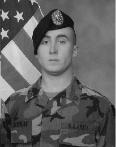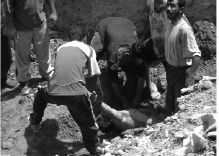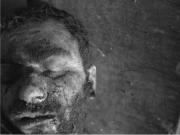Winter Soldier (28 page)
Authors: Iraq Veterans Against the War,Aaron Glantz
Tags: #QuarkXPress, #ebook, #epub

Serving a year in Iraq made me 100 percent confident that the fears and questions I had before deploying were accurate and maybe it was even worse than I anticipated. Progress wasn’t being made, and the few places that it was, it simply wasn’t worth the cost. The military has had enough.
Within months of our unit returning home we lost two of my good friends due to mental illness; one was alcohol and the other just reckless behavior. I know one was seeking support and I imagine since we were both going through the same VA he was on the same waiting list that I was on. Two years later, I’m still on that waiting list. Although these names don’t always appear on the evening news and these people don’t always die with full military honors, these are deaths that could have been prevented just like many in-theater deaths.
For example, when I first arrived in December 2004 our trucks had zero armor. It was right around that time when a brave specialist named Thomas Wilson questioned and criticized Secretary of Defense Donald Rumsfeld about this problem. Our first several missions we had what was affectionately known as “hillbilly armor”: a thin sheet of metal welded onto the sides of our trucks. It didn’t stop bullets. At best it slowed them down. It definitely slowed our trucks down. But once that brave specialist questioned Rumsfeld we all got armor within months. It took a brave soldier to raise that kind of question and to make it a media story. It definitely hurt our morale knowing that it took something like that for the administration to care about us. The same could be said about much of the other equipment we had. The night-vision goggles were a joke. They ran on AA batteries that usually lasted only a couple of hours and we had to shake them every time just to make the batteries work. When we experienced a night ambush outside of Samawa in southern Iraq, we couldn’t even see who was shooting at us. I’m not ashamed to admit that instead of trying to fire I was just kind of cowering behind the small armor that I had. You simply couldn’t see where your enemy was.
But lack of equipment isn’t the only problem that’s going on overseas. Regardless of what the Pentagon claims, I was definitely inadequately trained. I spent several hours in basic training learning how to use a bayonet, which is something most people haven’t used in combat in several decades. We never received one second of culture or language training. We encountered Iraqis almost daily on the roads, in the marketplaces outside of camps and bases, but we had no idea how to interact with them or how to respect them. Instead while at Fort Benning we received pep talks from well-paid contractors who came into our briefing rooms and insulted the intelligence of the hundreds of us who enlisted voluntarily to serve our country. I remember like it was yesterday, a chubby white guy came into our room. He tried telling us “those liberal tree huggers that are saying this war’s about oil are so wrong because we’re not importing any oil from Iraq.” I mean it doesn’t take a lot of research to realize that at the time of the invasion we were getting around 10 to 11 percent of our oil from Iraq. Having people stand before us while in uniform and lie to us hurt our morale.
We weren’t allowed to engage with the third-country nationals. They were very low-paid men and women, mostly men from poor countries that the United States hired for next to nothing. We treated them very poorly and disrespected them. They just got cans of food and a few bottles of water for a few weeks’ mission. We were told not to assist them but we were responsible for their safety, so that definitely added to our burden as a transportation company because these people came without armor or weapons and most of them didn’t know how to speak English or Arabic. I made around $30,000 a year while I was overseas and we’d be passed by the contractors who were making at least three or four times what we were making. We’d see ’em pass by in their black SUVs. They didn’t have to follow the same Rules of Engagement that we had and didn’t have to engage with the Iraqis the way we did, and that definitely leads to breakdown of the military.
We worked very long and hot days for very long periods of time, and we were almost always on edge. It was very hard to see my best friends break down. It was hard to constantly feel conflicted knowing I was in a situation I didn’t want to be in and on a mission that I didn’t support. I also knew that I was serving as an unofficial ambassador of the United States and I tried to treat the people that I encountered with respect. I tried to show them that just because our president was a money-hungry warmonger, America was still filled with people who really cared about them and were trying to do the right thing.
I believe the best way we can do that for the Iraqi people is to get out of their way and allow them to start rebuilding their land the way they want. We can and we should help them but our current occupation is doing more to deter that than it is actually assisting.
Lastly, I believe a big reason the military is breaking is because we’ve lost some of our best members, not only to death and injuries but also because many of us have gotten out. Those of us who enlisted to do what was right but wound up being sent to Iraq—we wound up getting out because we were asked to do what was wrong.
Those who speak against this war are not traitors; we are brave heroes honoring our commitment to this country. Those who wave the flag and have a yellow ribbon on their SUV and claim to support the troops but sit idly by and allow these disgraces to occur have betrayed our troops and betrayed our country. I believe if you truly want to support the troops the best way you can do that is to oppose this war that we never should have been sent to in the first place.

Sergeant, United States Army, Forward Observer
Deployments: January–December 2005, Sadr City
Hometown: Long Island, New York
Age at Winter Soldier: 27 years old

This is a picture here of me when I was ten years old wearing all camo, having a pair of dog tags, and giving my Boy Scout salute. That boy died in Iraq. This is the proud soldier who enlisted just after Christmas in 2003 to support and defend the Constitution of the United States.
I’m from Bellmore, a town in Long Island, New York, twenty minutes out of Manhattan. I could see the smoke when the towers fell on September 11. On September 12 I remember standing up in a pizza restaurant and telling everyone about how I wanted to kill everyone in the Middle East; how the Middle East should be turned into a glass plate by nuclear weapons because that’s what I believed. I joined the army to kill people.

I was nineteen years old when I deployed to Iraq and I spent the first eight months of my deployment in the slums of Sadr City. It’s a place that was neglected not only by Saddam Hussein but is horribly neglected by America right now. When we went there we promised them freedom; we promised to get them clean water, to get them food, to get them jobs. Instead, there are two to four hours of electricity a day, randomly. Sewage leaks into their fresh-water system. I never personally saw any contractors working on that water treatment plant outside Sadr City in 2005. My battalion discovered that and reported up and we were told to ignore the fact that nothing was going on. It was a sector that wasn’t within our area of operation so don’t be concerned with what goes on there.
Imagine living in a place where it gets up to 150 degrees. You don’t want to go out during the day, and at night American soldiers are rolling around your streets telling you that you can’t go outside, and you can’t talk to your friends, you can’t enjoy yourself. You can’t gather outside the coffeehouse or the shai shop because if you go out past dark you’re committing a crime. So essentially during the summer months Sadr City was a prison. Three million people in Sadr City were prisoners of war.
I graduated basic training at the top of my class. I graduated warrior leaders course, a leadership development course and noncommissioned officers course, with a 94 percent grade point average. I was a great soldier once upon a time and now I stand here to fight for my brothers more than I ever could while I wore a uniform.

What you see here is civilian Iraqis exhuming bodies of murdered and tortured Iraqis. This was on May 15, 2005, a very hot, uncomfortable, miserable day—I’ll never forget it. We don’t know why they were killed; we didn’t try very hard to find out. We found over a dozen bodies that day.

We weren’t authorized artillery, so I became the intelligence reporter and took pictures of these dead bodies. I was told it was so that we could try to identify them, but there was no identification process. I never went around to the police stations to post those photos. These photos were never used to help the Iraqis. These pictures were simply trophies of war for people who didn’t experience that death. People made videos to send home to their friends and family to brag. They were used to build morale, to say that killing is right, death is right, “Dead Iraqis are a great thing,” and that’s wrong.
While I was taking these pictures I never looked directly at the bodies. I had a digital camera and I held it out in front of me and I looked at the two-and-a-half-inch screen and I flashed that photo. As the flash went off each image was burned into my mind; every one of these pictures is burned into my mind.
